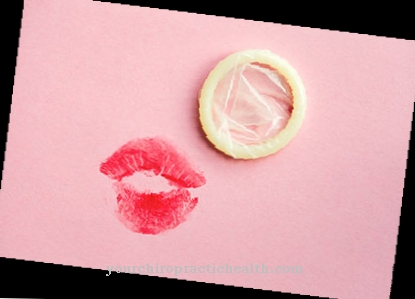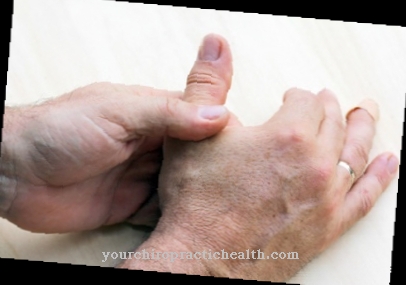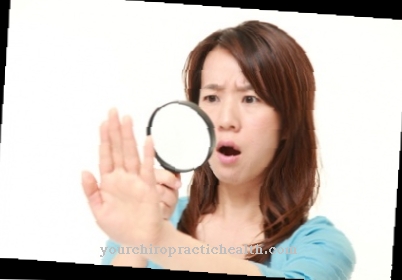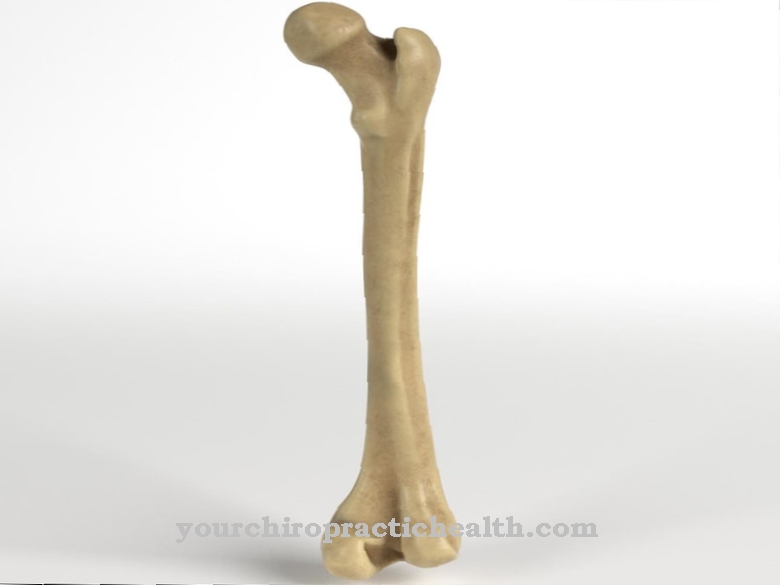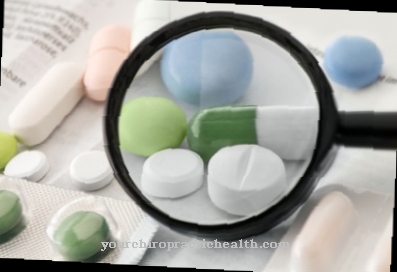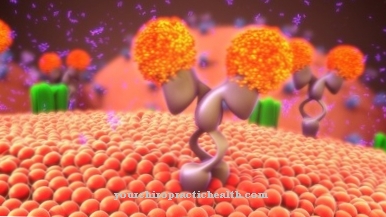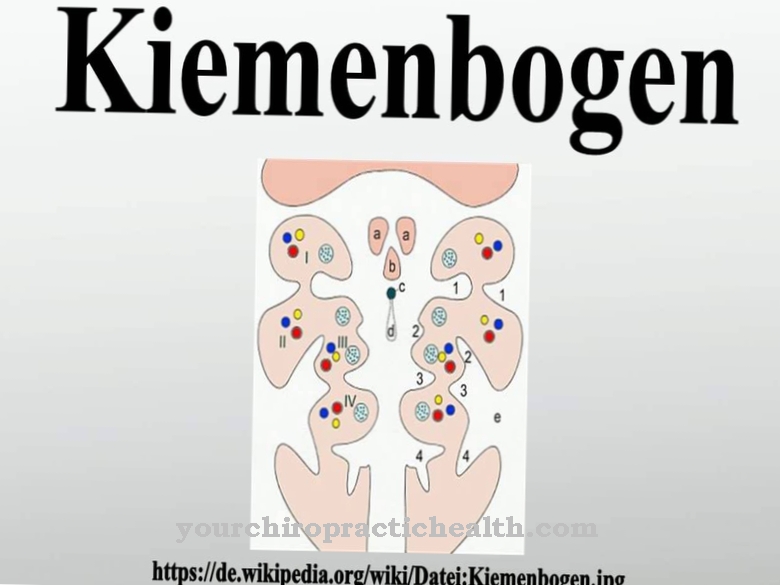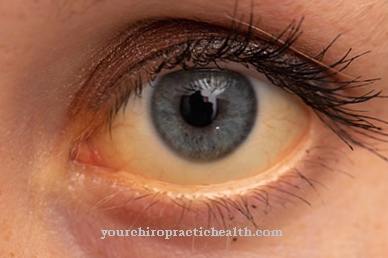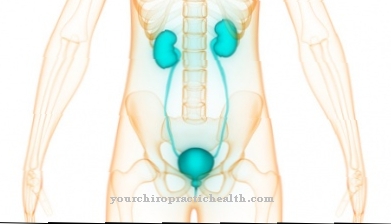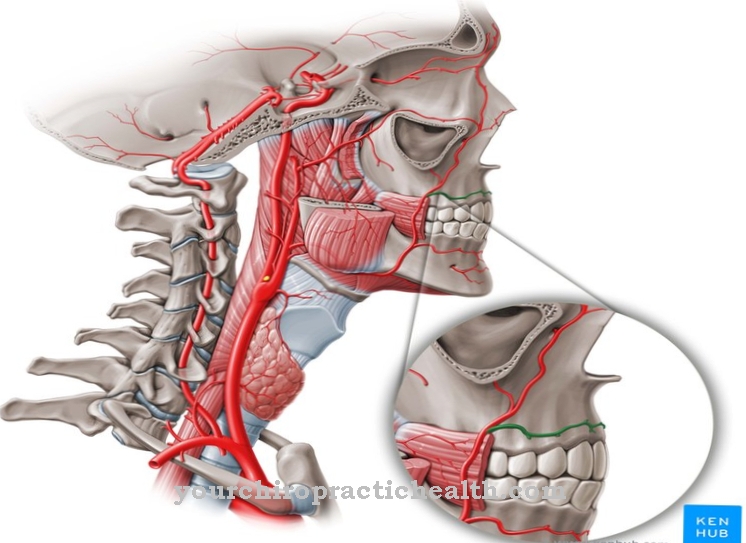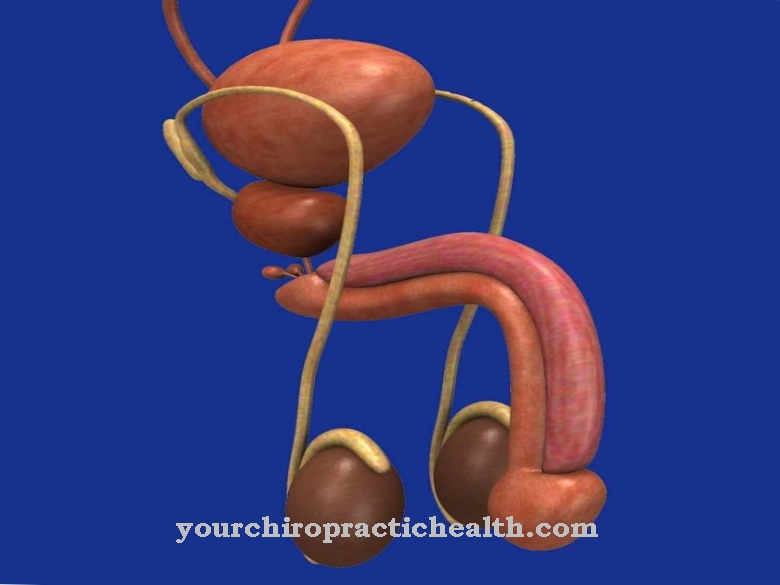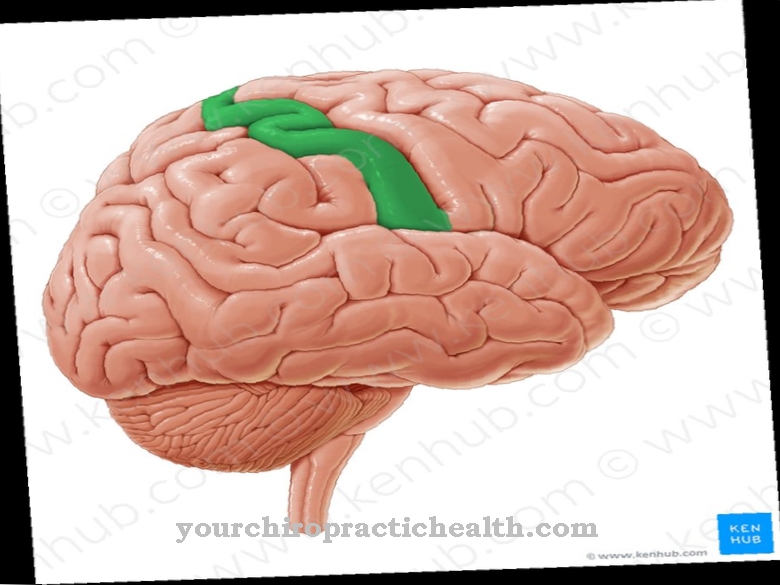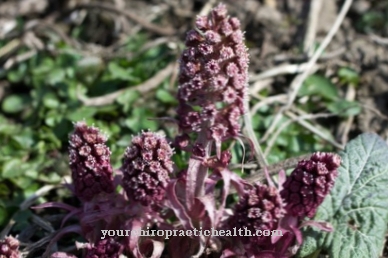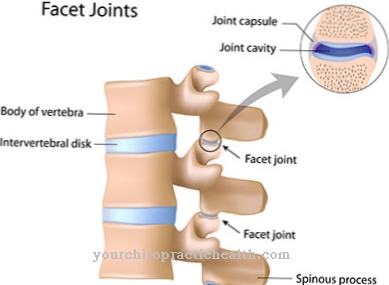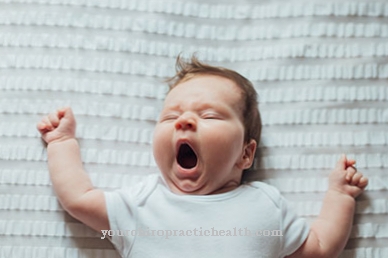Under Intestinal colic is understood to mean cramps in the intestinal area, which are caused by contractions of the intestinal muscles and usually last for 20 to 30 minutes. Intestinal colic is triggered by various causes, the most common being irritation and blockages in the intestine. The therapy depends on the duration, severity and cause of the disease.
What is intestinal colic?

© peterschreiber.media - stock.adobe.com
Intestinal colic is a common form of organ-related colic. Other organs that are often affected can be the kidneys or the bile, and in women the uterus. Colic on the stomach, pancreas, urinary bladder and salivary glands is less common.
The term "colic" originally only referred to pain in the large intestine, which is Latin for colon or colicus. Colic is pain of the highest imaginable level, which occurs as a function of movement and at intervals. They arise when the smooth organ muscles contract like a spasm because they are exposed to too much resistance. Intermittent means that the pain has a wave course: phases of relative freedom from symptoms alternate with strong pain peaks.
Frequent accompanying symptoms of colic are high blood pressure, sweating, nausea and vomiting, and tachycardia, the pulse that is greatly increased over a long period of time. The symptoms can increase to the point of circulatory collapse.
causes
Intestinal colic is a typical symptom of inflammatory bowel disease, Crohn's disease and ulcerative colitis. In ulcerative colitis, the mucous membranes of the mast and colon are inflamed, and in Crohn's disease, which can extend over the entire digestive tract, especially the small intestine.
But even people who do not have chronic bowel inflammation can suffer from intestinal colic.The causes are painful accumulations of gases in the intestine, called meteorism by the specialist, flatulence, adhesions and the associated constriction of intestinal areas, an acutely or chronically distended intestine or blockages in the intestine.
Intestinal blockages occur when, for example, tumors, foreign bodies or disorders of the intestinal wall narrow or completely block the intestinal tract.
An incorrect or intolerable diet, for example lactose intolerance, rarely leads to intestinal colic. These then occur spontaneously and once and last only a few minutes. Psychosomatic causes, for example too high a stress level, can also show up as intestinal colic.
You can find your medication here
➔ Medicines for stomach ailments and painSymptoms, ailments & signs
Intestinal colic manifests itself as severe, usually cramp-like stomach pain and cramps in the abdomen. The cramps occur at intervals and usually last between 20 and 30 minutes. Usually they are accompanied by nausea and vomiting as well as diarrhea. The severe pain irritates the peritoneum, which can lead to intestinal paralysis.
Such paralysis is expressed in turn by severe pain, if the treatment is not taken, an intestinal obstruction can occur, which can be recognized by a hard abdominal wall and severe pressure pain in the lower abdomen. The intestinal colic itself can also cause a fever. The increased body temperature is often accompanied by sweats, palpitations, and chills.
The blood pressure is extremely high and continues to rise as the disease progresses. If the course is severe, further complaints arise in the gastrointestinal tract. People tend to feel exhausted and tired, and a general feeling of exhaustion occurs.
Intestinal colic can lead to cardiac arrest if the symptoms are severe. In addition, bone fractures can occur as a result of the intense muscle contraction, and the rib region in particular is at risk. Outwardly, intestinal colic shows up with bulges in the abdomen and the often pale skin.
diagnosis
The medical diagnosis is based on a comprehensive anamnesis in order to clearly rule out functional or psychosomatic intestinal complaints and differential diagnoses, such as stomach diseases and gallstones.
The diagnosis of functional and psychosomatic complaints is difficult and usually first requires the exclusion of organic causes, but is important for defining the need for therapy and the correct medication. Organic causes of intestinal colic are determined with the help of ultrasound and X-ray examinations, endoscopic measures, computer or magnetic resonance tomography and, if the diagnosis is unclear, a surgical laparoscopy.
The imaging measures can optionally be carried out with the administration of contrast medium. The patient's descriptions of whether and how he feels bowel movements are also helpful, as well as listening to the bowel area, where loud splashing noises can often be detected.
Complications
Intestinal colic can lead to serious complications over time. Initially, diarrhea, flatulence and other complaints in the gastrointestinal tract can occur. In addition, there is often a feeling of exhaustion and a general feeling of exhaustion. The lack of appetite during the illness can lead to dehydration and various deficiency symptoms.
Complications can also arise when treating intestinal colic. The prescribed drugs can trigger allergies or the intestinal wall can be injured during an operation. If the colic is based on an intestinal obstruction, life-threatening fever symptoms and severe pain can occur in the course of the disease.
There is also the risk of a rupture of the intestine. In the case of severe complaints, cardiac arrest can also occur in the course of intestinal colic. Bone fractures can also occur with intense muscle contractions. It is not uncommon for those affected to bite their tongues or otherwise cramp, which increases the risk of an accident.
Cardiovascular patients as well as children, the elderly and patients with a corresponding pre-existing illness are particularly at risk. Due to the severity of the possible complications, a doctor should be consulted immediately if an intestinal colic is suspected.
When should you go to the doctor?
Occasional gastrointestinal upset, especially if the causes are known, such as fatty foods or high percentage alcohol, are not a cause for concern. The symptoms usually go away on their own after a few hours.
Simple home remedies like chamomile tea or Bullrich's salt can help calm the gastrointestinal tract quickly. However, caution is advised if such disorders occur frequently or if they become colic. A doctor should always be consulted with cramping pain in the abdomen. This is especially true if there are other symptoms.
Colic in combination with nausea, diarrhea and vomiting can indicate (food) poisoning. Although these are usually harmless, a doctor should still be consulted as a precaution. Medical help should also be sought if intestinal colic is accompanied by blood in the stool.
Particular caution is required if the person concerned still has an appendix and the right side of the abdomen is sensitive to pressure or if the bending of the right knee causes pain in the lower abdomen. In this case, it is likely to be appendicitis and should be presented to the doctor immediately. If the pain suddenly subsides, the emergency doctor must be informed immediately, as there could be a life-threatening rupture of the appendix.
Intestinal colic, which occurs in women depending on the cycle, can also be treated with over-the-counter medication or home remedies after consulting the gynecologist.
Doctors & therapists in your area
Treatment & Therapy
The treatment of intestinal colic depends on its cause and can be carried out using conventional medicine, homeopathic or traditional Chinese medicine or herbal treatments.
Conventional medicine usually prescribes painkillers, measures to inflate the intestine and antispasmodic medication as an immediate measure, as well as cause-related therapies. For example, changing the diet to a lactose-free diet can help allergy sufferers to treat their symptoms, antibiotics may be necessary or surgical interventions may have to be carried out to loosen and remove blockages.
Inflammatory bowel inflammation requires specific therapies, for example Crohn's disease patients receive additional adrenal hormones. Treatments with gentian, aniseed, St. John's wort, fennel, caraway oil, chamomile and ribwort in various combinations are more gentle, but not always helpful. They can be administered as herbal teas, scented applications, belly wraps and in the form of warm baths.
Traditional Chinese medicine treats those affected with acupuncture and relaxation exercises and is particularly helpful for stress-related and psychosomatic intestinal colic.
Outlook & forecast
Intestinal colic can be treated and cured with medical care in most patients. Basically, the prognosis is good, but it depends on the underlying disease. An improvement in the state of health has already occurred within a few hours. The cramps subside and the pain subsides. If the outcome is favorable, the patient will be completely free of symptoms after a few weeks. For organic causes there are numerous therapeutic approaches that are very promising and lead to a favorable prognosis.
If there is a chronic underlying disease, the chances of a cure are reduced. Chronic inflammation causes intestinal colic to recur at regular intervals and rarely leads to patient recovery. Nevertheless, precautionary measures can also be taken here in a medical treatment, which brings about a relief of the symptoms.
Psychosomatic comorbidities are also difficult. The patient often lacks insight into the illness. The symptoms often recur over many years or decades. An improvement only takes place as soon as the psychological problem has been treated and clarified. If the person concerned confronts therapy and the basic issue of psychological stress, he has a good chance of a cure. Without treatment, the risk of chronic disease and other, sometimes life-threatening, intestinal diseases increases.
You can find your medication here
➔ Medicines for stomach ailments and painprevention
Due to the variety of causes of intestinal colic, it is difficult to prevent it. A healthy lifestyle and diet and adherence to therapeutic measures for chronic intestinal inflammation prove to be helpful.
Aftercare
The extent to which aftercare is necessary depends on the course of the disease. Many complaints can be treated successfully within a few weeks. There is then no reason for scheduled follow-up examinations. However, patients can only prevent re-infection to a limited extent. A healthy diet and adequate sleep are considered beneficial to health after the first intestinal colic.
The situation is different with a chronic form. In this case, a cure is unlikely. The intestinal colic recurs from time to time. Imaging techniques are occasionally used to document the progress of the disease. Ultrasound and X-ray examinations are suitable. The intestinal tract can be monitored. A comprehensive anamnesis characterizes every control.
In this case, aftercare aims to support the patient in his or her everyday life. Life should be symptom-free. That is why drugs are also administered. They have an antispasmodic effect or contribute to the deflation of the intestines. If the causes of intestinal colic result from psychological conditions, relaxation exercises and other therapies can supplement the follow-up care.
The patient learns storylines that alleviate the intermittent pain peaks. Follow-up care is therefore only effective in the case of a chronic form of intestinal colic. It provides for ongoing documentation of the medical history. The patient should experience a symptom-free everyday life.
You can do that yourself
If you suspect intestinal colic, medical advice is always required. Various self-help measures and home remedies support conventional medical treatment and contribute to a quick recovery.
The characteristic gastrointestinal complaints can be alleviated primarily by bed rest and a diet that is gentle on the stomach. In the first ten days after an intestinal colic, food that is too fatty, spicy, sweet, salty or gasping should not be consumed. Instead, it is advisable to consume mainly rusks and light soups and also to drink a lot.
Home remedies from nature can also help against the symptoms. St. John's wort and fennel are said to have a pain relieving effect, while teas with caraway and chamomile relieve stomach cramps. Suitable uses are also fragrances, herbal teas, belly wraps and warm baths.
In general, the kidney and stomach area should always be kept sufficiently warm during an intestinal colic. This not only helps to alleviate the acute symptoms, it also prevents further diseases of the gastrointestinal tract. Sometimes it makes sense to change your lifestyle. Colic colic is usually caused by an unhealthy diet or stress. Together with the responsible doctor, the exact triggers can be determined and rectified.

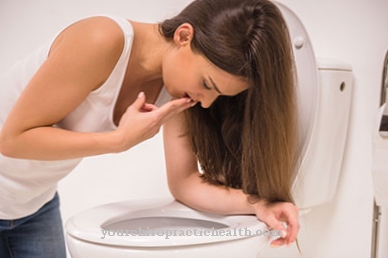
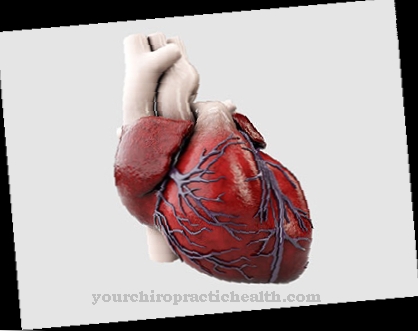
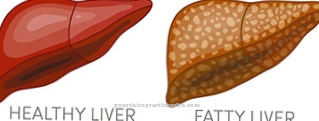
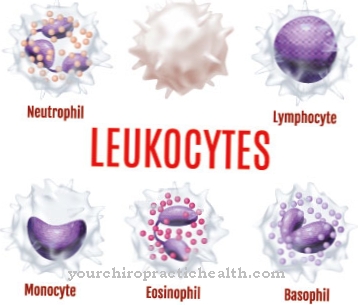
.jpg)
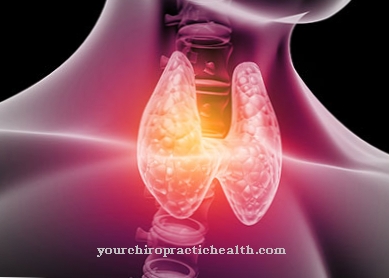

.jpg)
